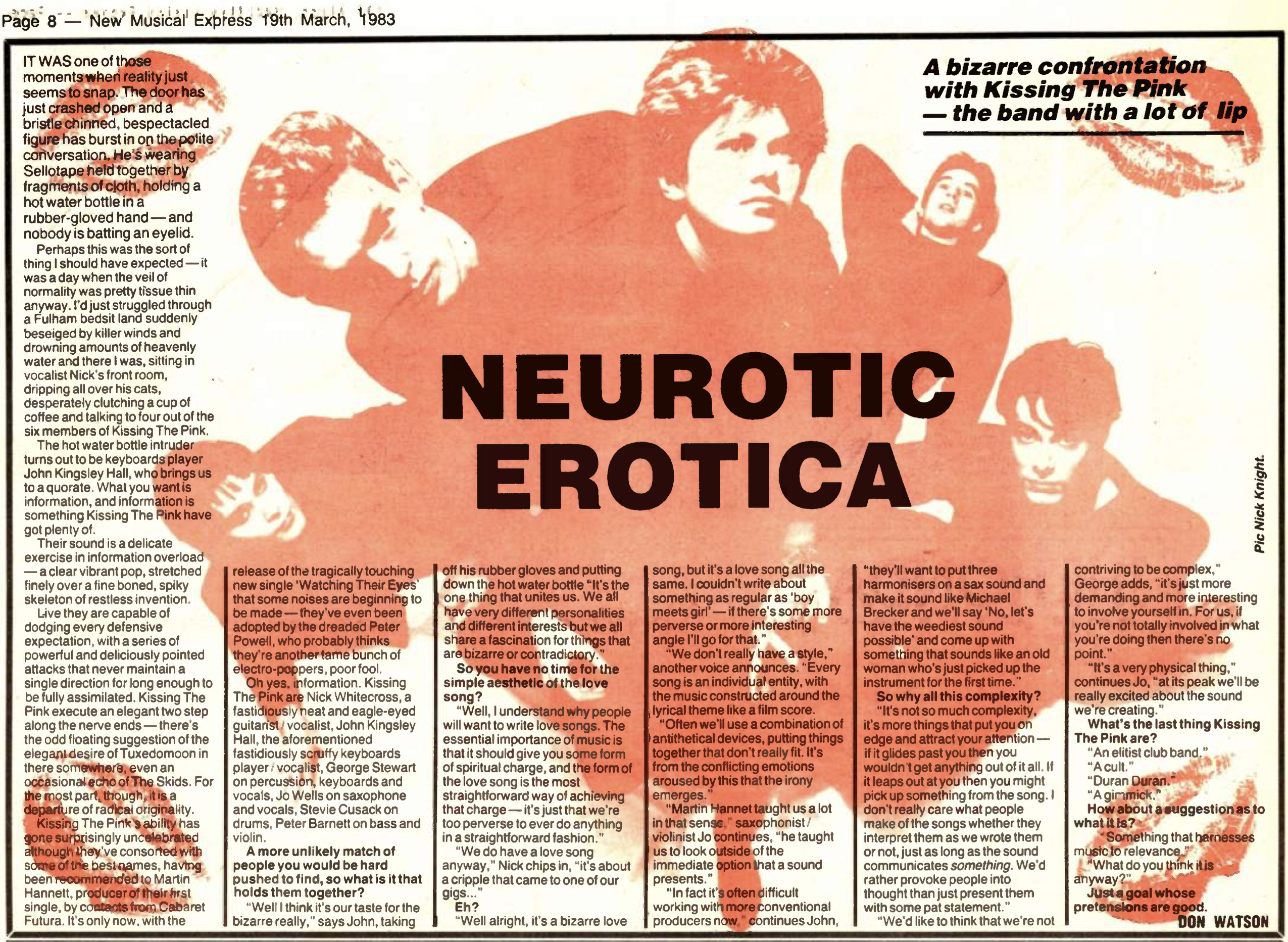A bizarre confrontation with Kissing The Pink — the band with a lot of lip
IT WAS one of those moments when reality just seems to snap. The door has just crashed open and a bristle chinned, bespectacled
figure has burst in on the polite conversation. He's wearing Sellotape held together by fragments of
cloth, holding a hot water bottle in a rubber-gloved hand — and nobody is batting an eyelid.
Perhaps this was the sort of thing I should have expected — it was a day when the veil of normality was pretty tissue thin anyway.
I'd just struggled through a Fulham bedsit land suddenly beseiged[sic] by killer winds and drowning amounts of heavenly water and
there I was, sitting in vocalist Nick's front room, dripping all over his cats, desperately clutching a
cup of coffee and talking to four out of the six members of Kissing The Pink.
The hot water bottle intruder turns out to be keyboards player John Kingsley Hall, who brings us to a quorate. What you want is
information, and information is something Kissing The Pink have got plenty of.
Their sound is a delicate exercise in information overload — a clear vibrant pop, stretched finely over a fine boned, spiky
skeleton of restless invention.
Live they are capable of dodging every defensive expectation, with a series of powerful and deliciously pointed attacks that never
maintain a single direction for long enough to be fully assimilated. Kissing The Pink execute an elegant two step along the nerve
ends — there's the odd floating suggestion of the elegant desire of Tuxedomoon in there somewhere, even an occasional echo of The
Skids.
For the most part though, it is a departure of radical originality.
Kissing The Pink's ability has gone surprisingly uncelebrated although they've consorted with some of the best names, having been
recommended to Martin Hannett, producer of their first single, by contacts from Cabaret Futura. It's only now. with the release of
the tragically touching new single 'Watching Their Eyes' that some noises are beginning to be made — they've even been adopted by
the dreaded Peter Powell, who probably thinks they're another tame bunch of electro-poppers, poor fool.
Oh yes. information. Kissing The Pink are Nick Whitecross, a fastidiously neat and eagle-eyed
guitarist/vocalist, John Kingsley Hall, the aforementioned fastidiously scruffy keyboards
player/vocalist, George Stewart on percussion, keyboards and vocals, Jo
Wells on saxophone and vocals, Stevie Cusack on drums, Peter
Barnett on bass and violin.
A more unlikely match of people you would be hard pushed to find, so what is it that holds them together?
"Well I think it's our taste for the bizarre really," says John, taking off his rubber gloves and putting down the hot water bottle
"It's the one thing that unites us. We all have very different personalities and different interests but we all share a fascination
for things that are bizarre or contradictory."
So you have no time for the simple aesthetic of the love song?
"Well, I understand why people will want to write love songs. The essential importance of music is that it should give you some
form of spiritual charge, and the form of the love song is the most straightforward way of achieving that charge — it's just that
we're too perverse to ever do anything in a straightforward fashion."
"We do have a love song anyway," Nick chips in, "it's about a cripple that came to one of our gigs…"
Eh?
"Well alright, it's a bizarre love song, but it's a love song all the same. I couldn't write about something as regular as 'boy
meets girl' — if there's some more perverse or more interesting angle l'll go for that."
"We don't really have a style," another voice announces. "Every song is an individual entity, with
the music constructed around the lyrical theme like a film score.
"Often we'll use a combination of antithetical devices, putting things together that don't really fit. It's from the conflicting
emotions aroused by this that the irony emerges."
"Martin Hannet[sic] taught us a lot in that sense." saxophonist / violinist[sic] Jo continues, "he taught
us to look outside of the immediate option that a sound presents."
"In fact it's often difficult working with more conventional producers now " continues John,
"they'll want to put three harmonisers on a sax sound and make it sound like Michael Brecker and we'll say 'No, let's have the
weediest sound possible' and come up with something that sounds like an old woman who's just picked up the instrument for the first
time."
So why all this complexity?
"It's not so much complexity, it's more things that put you on edge and attract your attention — if it glides past you then you
wouldn't get anything out of it all. If it leaps out at you then you might pick up something from the song. l don't really care
what people make of the songs whether they interpret them as we wrote them or not, just as long as the sound communicates
something. We'd rather provoke people into thought than just present them with some pat statement."
"We'd like to think that we're not contriving to be complex," George adds, "it's just more demanding and more interesting to
involve yourself in. For us, if you're not totally involved in what you're doing then there's no point."
"It's a very physical thing," continues Jo, "at its peak we'll be really excited about the sound we're creating."
What's the last thing Kissing The Pink are?
"An elitist club band."
"A cult."
"Duran Duran."
"A gimmick."
How about a suggestion as to what it is?
"Something that harnesses music to relevance."
"What do you think it is anyway?"
Just a goal whose pretensions are good.
